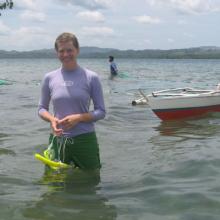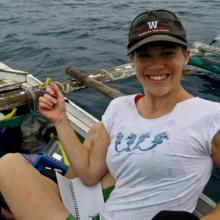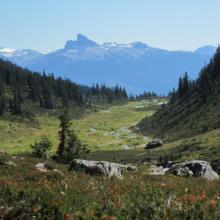Jennifer Selgrath
Why did you decide to pursue a graduate degree?
My interest in studying conservation in developing countries emerged from my travel experiences while an undergrad at Wesleyan University. During breaks I traveled to Central America and Southeast Asia. I visited areas with serious environmental problems, but saw that answers to these issues were not straightforward and were often in conflict with human needs for food and other resources. This insight into the trade-offs between long-term sustainability and short-term productivity was uncomfortable, but inspiring. I became dedicated to promoting sustainable resource use to support healthy ecosystems and the people who rely on them. I have enacted this dedication by working in education, policy, and conservation research – three areas that are synergistic branches of conservation.
Why did you decide to study at UBC?
I came to UBC because I wanted to work with Dr. Amanda Vincent and Project Seahorse. Project Seahorse is highly unusual in a university setting, because we advance marine conservation by blending academic rigor with applied management and policy work. This is what I wanted from my PhD—working on research that is valuable for real-world conservation needs.
What do you hope to accomplish with your research?
My research presents a spectacular opportunity to build insight into the responses of coastal habitats to fishing threats. Identifying factors that contribute to coral reef ecosystems' recovery and resistance to threats will provide insight for global conservation efforts. Since the region in the Philippines where I work is one of the few known areas where coral reef habitat recovery has occurred after protection, it is a model system for addressing habitat change questions. The issue of habitat change is valuable for achieving many conservation goals such as biodiversity protection because strategies for protecting biodiversity often require protecting the habitats that species depend on. By addressing options for MPA siting, my research will be informative of how to strategically place MPAs to meet stated conservation objectives. This will provide a model of how best to site MPAs in other tropical developing countries facing similar habitat impacts. Finally, my research will contribute to a brighter future for coastal communities by informing future management strategies.
What are your future career goals?
My career beacon shines its light on marine conservation and I plan to work at the interface between conservation science and environmental policy. I don't expect to know the road that it will take me down until I arrive there, but options are academia, government (NOAA, USAID), or an environmental NGO.
What has been your most memorable Vancouver experience so far?
Hard to choose! The first thing that comes to mind is participating in Critical Mass—the monthly event that promotes city-wide awareness of bicycling. It has a wonderful spirit of adventure and helps drivers become more aware that cyclists are an important part of traffic. This is especially valuable to me because I am recovering from a near-fatal bicycle accident that happened because a driver failed to notice me! The first critical mass I went on this year was also pirate themed, and I'll take any excuse to dress up like a pirate!
What advice do you have for new graduate students?
Vancouver is a magnificent city. It has many of the wonderful qualities of the west coast of the US (I'm biased since that is where I come from!) and it is so close to the ocean and the mountains that the wilderness is practically in the city's backyard. I have found people in Vancouver to be warm, open, and creative which has been an especially lovely part of living here. The cheese is too expensive, but the excellent health care makes up for it!
Personal Interests / Hobbies
Dance artist, stop animation, hiking, environmental education, cooking, cycling, singing, meditating



